Related Research Articles
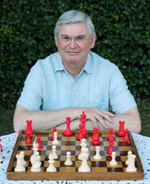
Sir Alan Roy Fersht is a British chemist at the Laboratory of Molecular Biology and an Emeritus Professor in the Department of Chemistry at the University of Cambridge; and is a former Master of Gonville and Caius College, Cambridge. He works on protein folding.

Richard Henderson is a Scottish molecular biologist and biophysicist and pioneer in the field of electron microscopy of biological molecules. Henderson shared the Nobel Prize in Chemistry in 2017 with Jacques Dubochet and Joachim Frank.
Dame Carol Vivien Robinson, is a British chemist and former President of the Royal Society of Chemistry (2018–2020). She is a Royal Society Research Professor at the Physical and Theoretical Chemistry Laboratory at the University of Oxford, as well as the Dr Lee's Professor of Physical and Theoretical Chemistry, and a Professorial Fellow at Exeter College. She was previously Professor of Mass Spectrometry at the Department of Chemistry of the University of Cambridge.

Sir Christopher Martin Dobson was a British chemist, who was the John Humphrey Plummer Professor of Chemical and Structural Biology in the Department of Chemistry at the University of Cambridge, and Master of St John's College, Cambridge.

(David) Julian (Harry) Downward FRS FMedSci is Associate Research Director at the Francis Crick Institute and Senior Group Leader at the Institute of Cancer Research. He was formerly head of the Signal transduction Laboratory at the London Research Institute. He is a member of the Editorial Board for Cell.
Sheena Elizabeth Radford FRS FMedSci is a British biophysicist, and Astbury Professor of Biophysics in the Astbury Centre for Structural Molecular Biology, School of Molecular and Cellular Biology at the University of Leeds. Radford is the Associate Editor of the Journal of Molecular Biology.
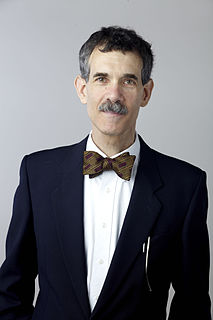
David Ron MD FRS FMedSci is an Israeli-born and educated UK-based life scientist.

Gideon John Davies is a Professor of Chemistry in the Structural Biology Laboratory (YSBL) at the University of York, UK. Davies is best known for his ground-breaking studies into carbohydrate-active enzymes, notably analysing the conformational and mechanistic basis for catalysis and applying this for societal benefit. In 2016 Davies was apppointed the Royal Society Ken Murray Research Professor at the University of York.
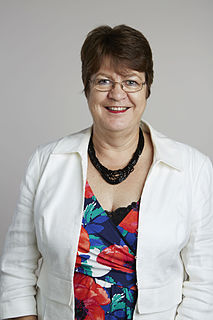
Jane Clarke is an English biochemist and academic. Since October 2017, she has served as President of Wolfson College, Cambridge. She is also Professor of Molecular Biophysics, a Wellcome Trust Senior Research Fellow in the Department of Chemistry at the University of Cambridge. She was previously a Fellow of Trinity Hall, Cambridge.

Ketan Jayakrishna Patel is a British-Kenyan scientist who is Director of the MRC Weatherall Institute of Molecular Medicine and the MRC Molecular Haematology Unit at the University of Oxford. Until 2020 he was a tenured principal investigator at the Medical Research Council (MRC) Laboratory of Molecular Biology (LMB).

Annette Catherine Dolphin is a Professor of Pharmacology in the Department of Neuroscience, Physiology and Pharmacology at University College London (UCL).

Roger Lee Williams is a structural biologist and group leader at the Medical Research Council (MRC) Laboratory of Molecular Biology. His group studies the form and flexibility of protein complexes that associate with and modify lipid cell membranes. His work concerns the biochemistry, structures and dynamics of these key enzyme complexes.
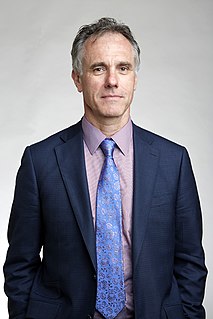
Richard Malcolm Marais is Director of the Cancer Research UK (CRUK) Manchester Institute and Professor of Molecular Oncology at the University of Manchester.

Sir Richard Henry Treisman is a British scientist specialising in the molecular biology of cancer. Treisman is a director of research at the Francis Crick Institute in London.

Neil Alexander Steven Brockdorff is a Wellcome Trust Principal Research Fellow and professor in the department of biochemistry at the University of Oxford. Brockdorff's research investigates gene and genome regulation in mammalian development. His interests are in the molecular basis of X-inactivation, the process that evolved in mammals to equalise X chromosome gene expression levels in XX females relative to XY males.
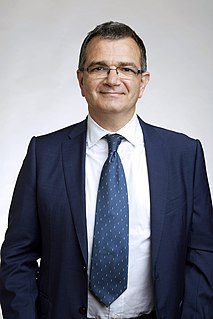
Vincenzo Cerundolo was the Director of the Medical Research Council (MRC) Human Immunology Unit at the University of Oxford, at the John Radcliffe Hospital and a Professor of Immunology at the University of Oxford. He was also a Supernumerary Fellow at Merton College, Oxford. He was known for his discoveries in processing and presentation of cancer and viral peptides to T cells and lipids to invariant NKT cells. Cerundolo died of lung cancer on 7 January 2020.
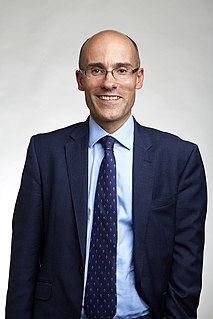
(Robert) Charles Swanton is British physician scientist specialising in oncology and cancer research. Swanton is a senior group leader at London's Francis Crick Institute, Royal Society Napier Professor in Cancer and thoracic medical oncologist at University College London and University College London Hospitals, co-director of the Cancer Research UK (CRUK) Lung Cancer Centre of Excellence, and Chief Clinician of Cancer Research UK.
Charles Bangham holds the Chair in Immunology at Imperial College London.
Caetano Maria Pacheco Pais dos Reis e Sousa is a senior group leader at the Francis Crick Institute and a professor of Immunology at Imperial College London.
(Thomas) Martin Embley is a professor at Newcastle University who has made contributions to our understanding of the origin of eukaryotes and the evolution of organelles such as mitochondria, mitosomes and hydrogenosomes, that are found in parasitic protists.
References
- 1 2 3 4 5 6 7 8 9 10 Anon (2019). "Professor Gurdyal Besra FMedSci FRS". royalsociety.org. London: Royal Society. Archived from the original on 2019-04-24. One or more of the preceding sentences incorporates text from the royalsociety.org website where:
“All text published under the heading 'Biography' on Fellow profile pages is available under Creative Commons Attribution 4.0 International License.” --Royal Society Terms, conditions and policies at the Wayback Machine (archived 2016-11-11)
- 1 2 "Chemistry Biology Interface Division mid-career award: Jeremy Knowles Award".
- 1 2 Gurdyal Besra publications indexed by Google Scholar
- ↑ Waller, R. F.; Keeling, P. J.; Donald, R. G. K.; Striepen, B.; Handman, E.; Lang-Unnasch, N.; Cowman, A. F.; Besra, G. S.; Roos, D. S.; McFadden, G. I. (1998). "Nuclear-encoded proteins target to the plastid in Toxoplasma gondii and Plasmodium falciparum". Proceedings of the National Academy of Sciences. 95 (21): 12352–12357. Bibcode:1998PNAS...9512352W. doi: 10.1073/pnas.95.21.12352 . ISSN 0027-8424. PMC 22835 . PMID 9770490.
- ↑ Gurdyal Besra publications from Europe PubMed Central
- ↑ Gurdyal Besra publications indexed by the Scopus bibliographic database. (subscription required)
- ↑ Gurdyal Besra on Twitter
- ↑ Gurdyal Besra's ORCID 0000-0002-5605-0395
- ↑ Besra, Gurdyal Singh (1990). Studies on the lipids of the leprosy bacillus. ncl.ac.uk (PhD thesis). University of Newcastle upon Tyne. OCLC 557262768. EThOS uk.bl.ethos.303125.